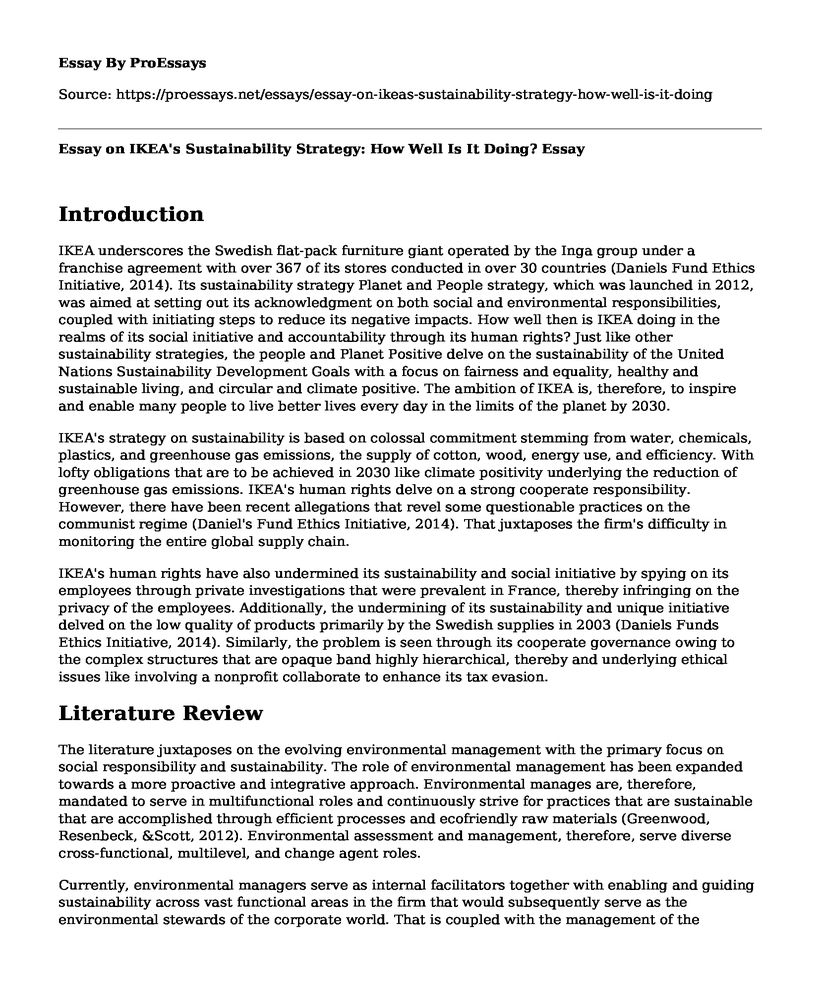Introduction
IKEA underscores the Swedish flat-pack furniture giant operated by the Inga group under a franchise agreement with over 367 of its stores conducted in over 30 countries (Daniels Fund Ethics Initiative, 2014). Its sustainability strategy Planet and People strategy, which was launched in 2012, was aimed at setting out its acknowledgment on both social and environmental responsibilities, coupled with initiating steps to reduce its negative impacts. How well then is IKEA doing in the realms of its social initiative and accountability through its human rights? Just like other sustainability strategies, the people and Planet Positive delve on the sustainability of the United Nations Sustainability Development Goals with a focus on fairness and equality, healthy and sustainable living, and circular and climate positive. The ambition of IKEA is, therefore, to inspire and enable many people to live better lives every day in the limits of the planet by 2030.
IKEA's strategy on sustainability is based on colossal commitment stemming from water, chemicals, plastics, and greenhouse gas emissions, the supply of cotton, wood, energy use, and efficiency. With lofty obligations that are to be achieved in 2030 like climate positivity underlying the reduction of greenhouse gas emissions. IKEA's human rights delve on a strong cooperate responsibility. However, there have been recent allegations that revel some questionable practices on the communist regime (Daniel's Fund Ethics Initiative, 2014). That juxtaposes the firm's difficulty in monitoring the entire global supply chain.
IKEA's human rights have also undermined its sustainability and social initiative by spying on its employees through private investigations that were prevalent in France, thereby infringing on the privacy of the employees. Additionally, the undermining of its sustainability and unique initiative delved on the low quality of products primarily by the Swedish supplies in 2003 (Daniels Funds Ethics Initiative, 2014). Similarly, the problem is seen through its cooperate governance owing to the complex structures that are opaque band highly hierarchical, thereby and underlying ethical issues like involving a nonprofit collaborate to enhance its tax evasion.
Literature Review
The literature juxtaposes on the evolving environmental management with the primary focus on social responsibility and sustainability. The role of environmental management has been expanded towards a more proactive and integrative approach. Environmental manages are, therefore, mandated to serve in multifunctional roles and continuously strive for practices that are sustainable that are accomplished through efficient processes and ecofriendly raw materials (Greenwood, Resenbeck, &Scott, 2012). Environmental assessment and management, therefore, serve diverse cross-functional, multilevel, and change agent roles.
Currently, environmental managers serve as internal facilitators together with enabling and guiding sustainability across vast functional areas in the firm that would subsequently serve as the environmental stewards of the corporate world. That is coupled with the management of the relationship between the firm and the environment. They incorporated internal and external communication ion, raising awareness to key stakeholders in the provision of accurate information on environmental and social factors that are related to the services and products. Environmental management systems can, therefore, be used as communication tools for vital information to primary stakeholders and act as leverages on essential information that needs to be communicated. Environmental managers are vast with defined responsibilities that are related to the aspects of the environment, coupled with their impacts that would aid in the reduction of adverse environmental effects in the processes of the organization, maintenance of regulatory compliance, and avoidance of unnecessary ecological liabilities.
References
Daniels Fund Ethics Initiative. IKEA Address Ethical and Social Responsibility. University ofNew Mexico, 2014, https://danielsethics.mgt.unm.edu/pdf/ikea.pdf
Greenwood, L., Rosenbeck, J., & Scott, J. (2012). The Role of Environmental Manager inAdvancing Environmental Sustainability and Social Responsibility in the Organization.Journal of Environmental Sustainability.2 (2). Retrieved fromDOI:10.144448/jes.02.0005
Cite this page
Essay on IKEA's Sustainability Strategy: How Well Is It Doing?. (2023, May 23). Retrieved from https://proessays.net/essays/essay-on-ikeas-sustainability-strategy-how-well-is-it-doing
If you are the original author of this essay and no longer wish to have it published on the ProEssays website, please click below to request its removal:
- Direct Power - Essay Sample
- The Use of Equal Opportunity or Employment Diversity in Walmart Inc - Paper Example
- What Are the Three Ethical Decision Criteria? Essay Example
- Teamwork Contributes to the Acquisition of Leadership Skills
- Risk Mitigation Through Employee Insurance: RBC Analysis - Essay Sample
- Paper Example on Strategic Change Management: Vital Role for Org Success & Realizing Goals
- Organisational Theory: How to Create & Manage an Effective Team - Free Research Paper Sample







